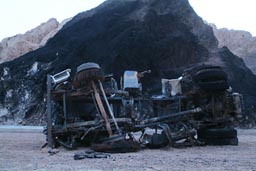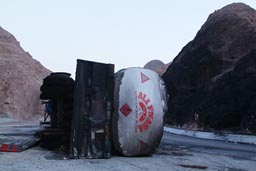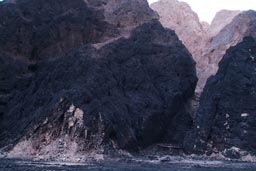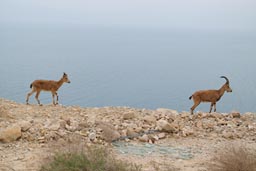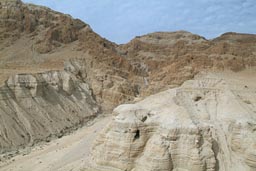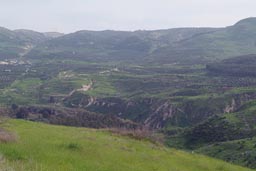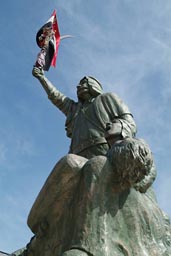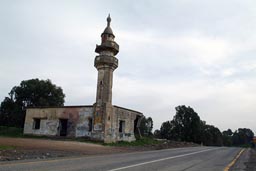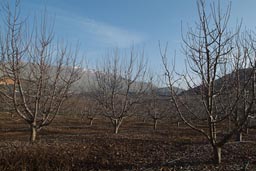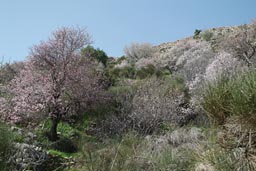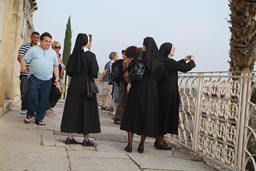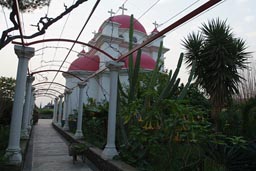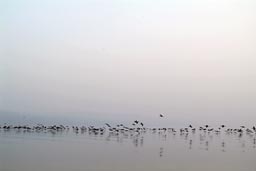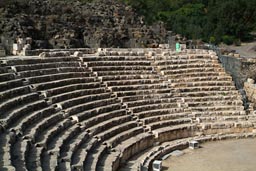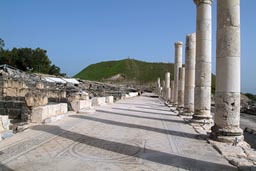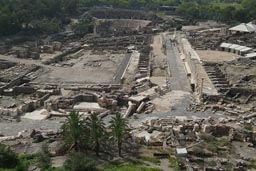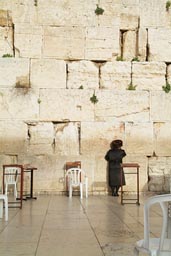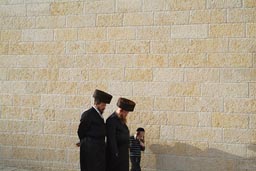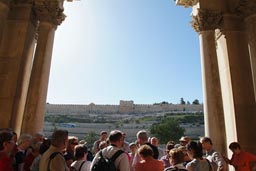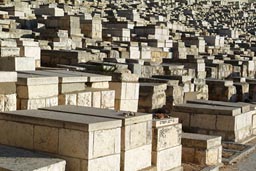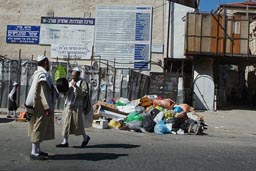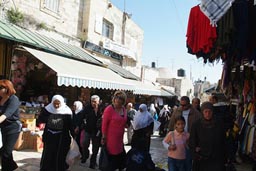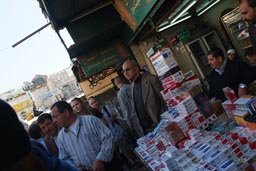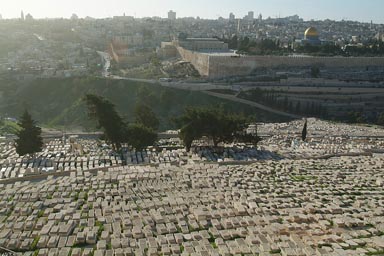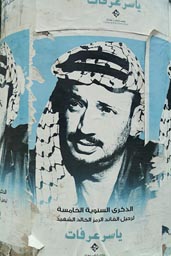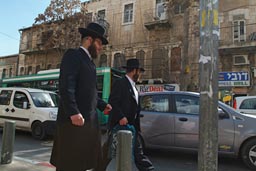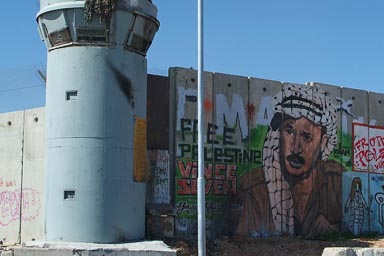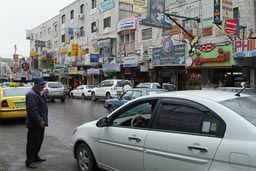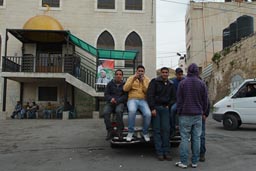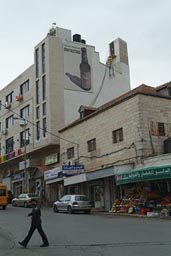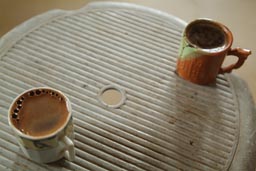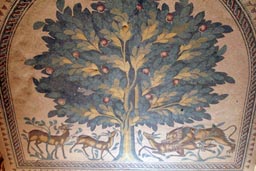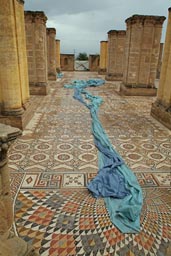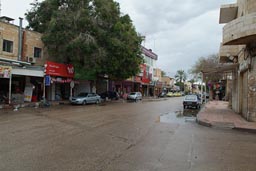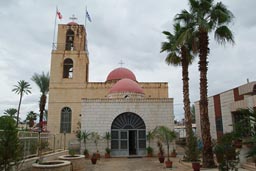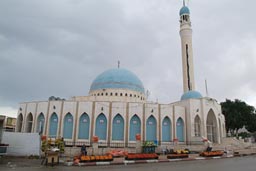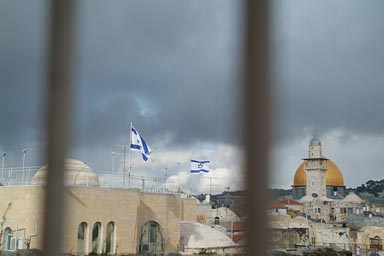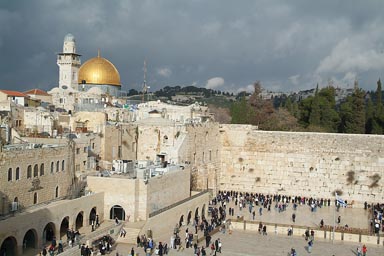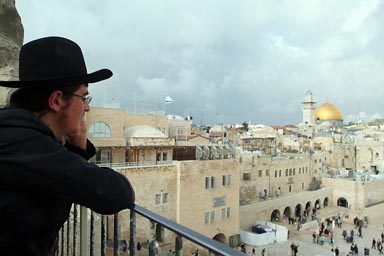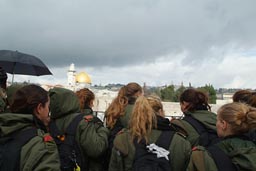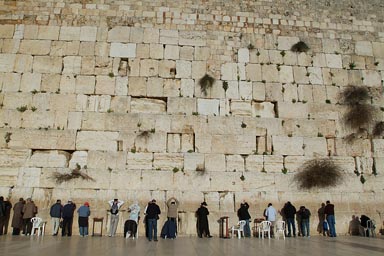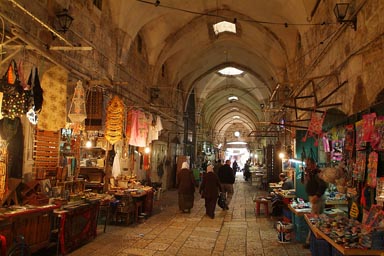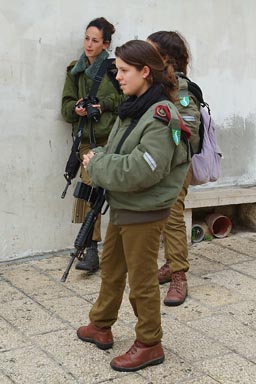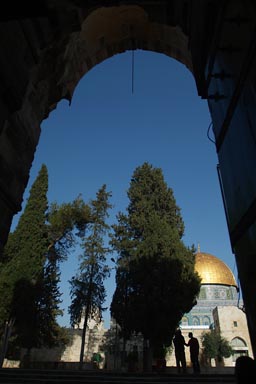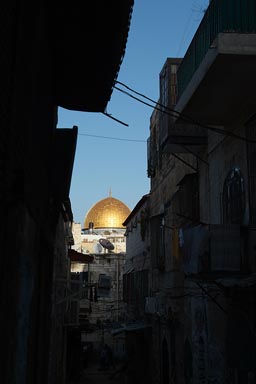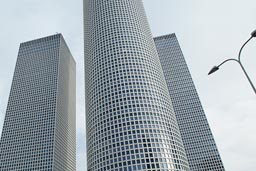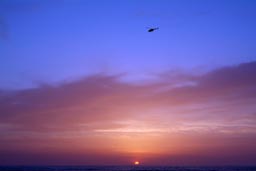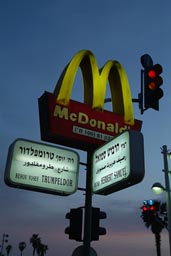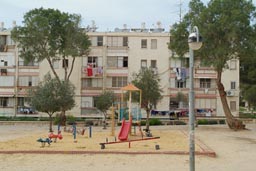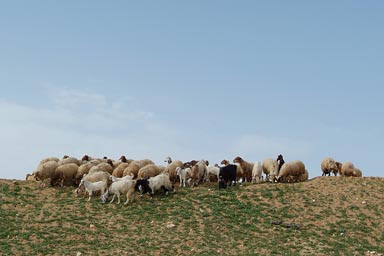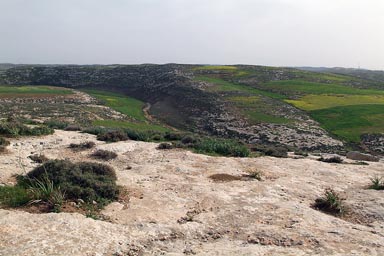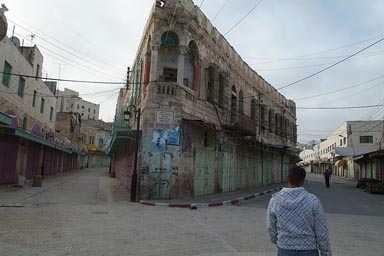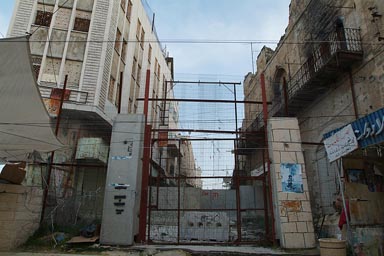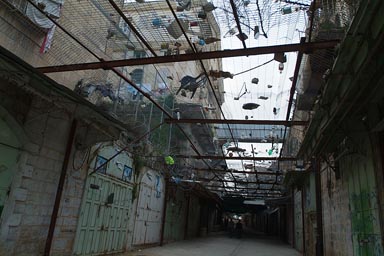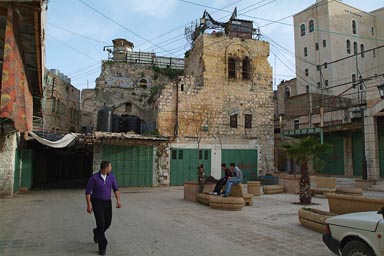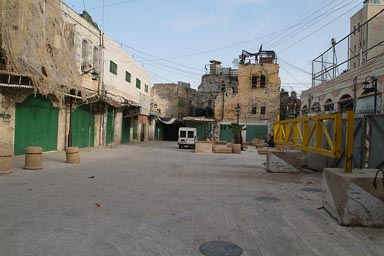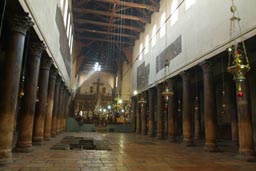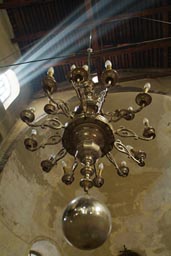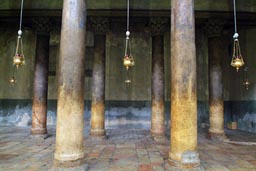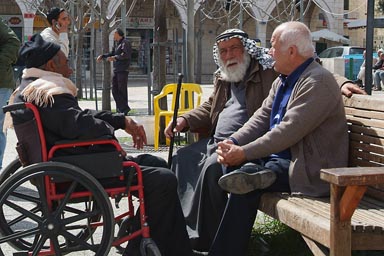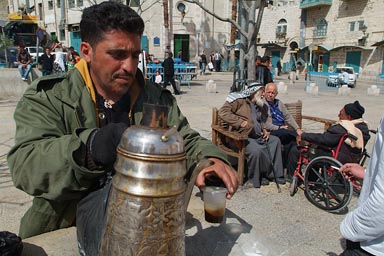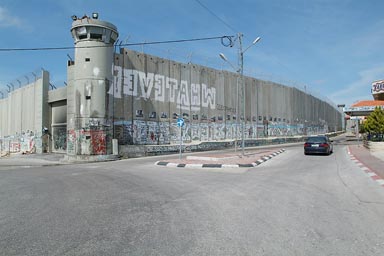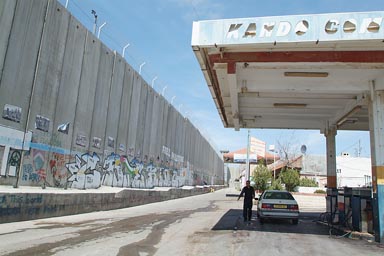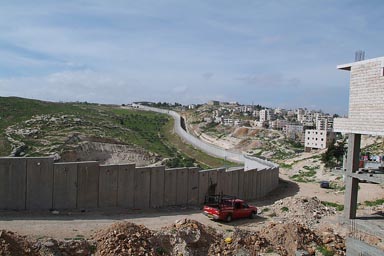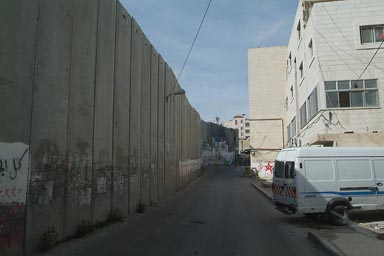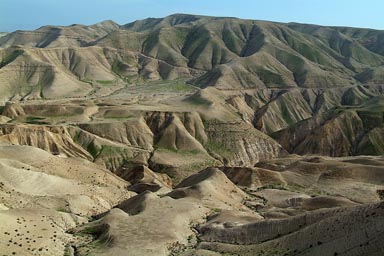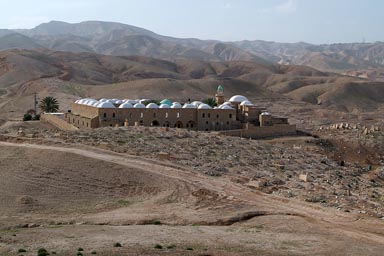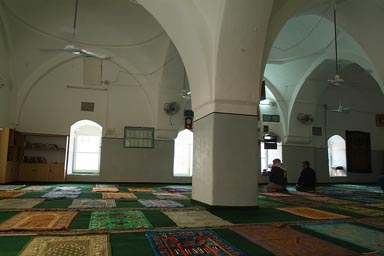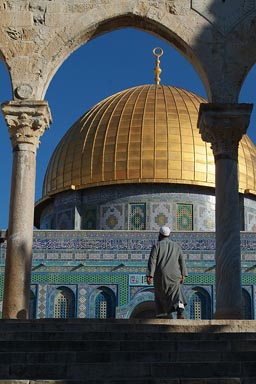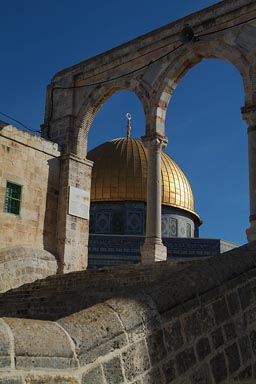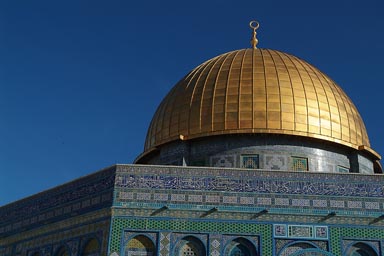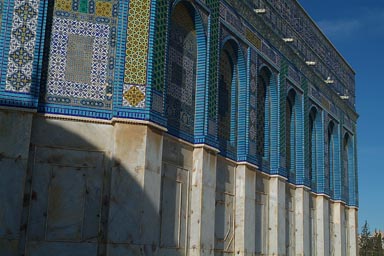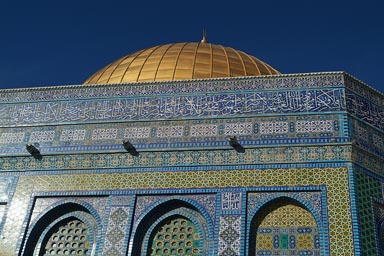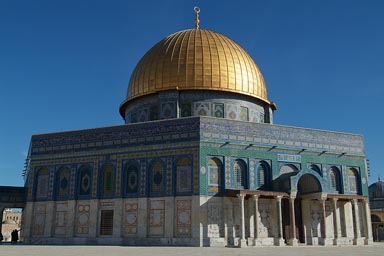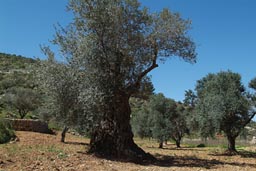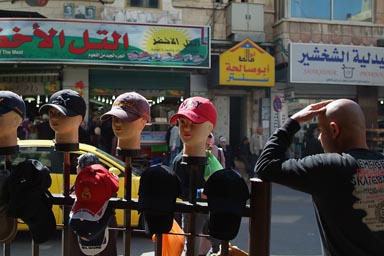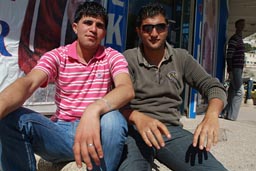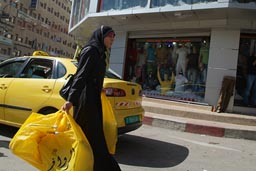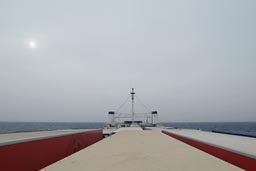www.thisfabtrek.com > journey > asia > israel-palestine > 20100306-jerusalem
Enter the holy lands. North, north to the Golan Heights.
Download GPS (KML) track/waypoints.
When I start writing this I am on a cargo boat from Haifa, Israel to Limasol, Cyprus. I have left the lands of the guns, of automatic rifles hung over any bodies’ shoulder. The holy lands, the lands of religions and religious wars and religion induced conflicts, the killing fields of thousands of years! Whose God was it good for? Was it worth it?
This is the story of Israel and Palestine; it is the most difficult I have written, the conflict is a difficult one and it is hard to speak out. But then this is my story, my journey, my thoughts. I hope you don’t mind.
Egypt, Sunday morning 14th of Feb a Latte to go from Beano’s and Christina and I ride out of Cairo. Nobody stops us, no further problems with the still only half-good car papers and no insurance. Under the Suez Canal, over the Sinai Desert, a tank lorry exploded not too many days ago, lies burnt out by the roadside, leaving the half of a mountain charcoaled black. Reaching the Gulf of Aqabah/Eilat we rethink our options, change our plan and go straight into Israel. It would be a mistake in this journey through history and time not to enter Israel/Palestine and Jerusalem; holy golden city to the 3 famous monotheist religions.
But first we travel through the Negev desert, then along the Dead Sea shore to Qumran which is the site of a settlement (maybe of the Essenes sect, or just a villa/farm) and caves where in 1947 a spectacular Bedouin find led to the excavation of 900 scrolls in clay pots containing word by word nearly all the Books of the Hebrew Bible (Tanakh) and more. Believed being written by the Essenes in 150 B.C. to 70 A.D., the scrolls seem to have been hid before the Roman invaders for preservation (only brought there for hiding). We would later see some of the famous scrolls on exhibit in the Shrine of the Book in Jerusalem (wiki). Interesting is that before the Qumran find the oldest extant bible codex was in Greek more than one thousand years younger, the Qumran scrolls showed some books to be identical nearly word by word, some considerable different. (wiki)
The journey goes on through the depression at 400m below sea level; the Jordan valley, a hazy morning is followed by a hazy evening, sweat and mosquitoes at night. Further north into the valley of the Yarmouk River, border between Jordan and Israel; I drove the other side more than 2 months ago, very rainy, so lush and green then and so lush and green now. Always startled when I go from desert to greenery so quickly!
Further north over the plateau of the Golan Heights; all this was Syrian till the 1967 6-day war between Israel and the Arab states (most of them). Syria till today is laying claims to the land. Further north to the base of Mount Hermon and the Druze village of Majdal Shams (tower of the sun), at an altitude of 1,000m; this is the farthest northern point in Israel. Somewhere I read that Yitzhak Rabin and Hafiz al-Assad were quite close in striking a peace-deal just before his, Rabin’s assassination in 1995.
Today nothing could look further away than a deal; the saber-rattling has only been intensifying in recent weeks. The Druze up here, most of them tend to support the Syrians, take it with ease. "Salam, peace, thanks it is here, may it last" explains the shop owner where we buy our honey; he invites us in for coffee. Druze speak Arabic so conversation is possible, they don't consider themselves as Muslims, their sign is the star in 5 colors, the 5 colors fly on every roof top in Majdal Shams. Our noble host has two sons working/living/married in the US, he has travelled to New York, Washington and Ohio, but what America does in Afghanistan and Iraq, "Crazy, crazy." Photography on the wall shows him with a local politician, "a member of the Knesset, my friend," also a large Gamal Abdel Nasser and a Hafiz al-Assad decorates the wall. Damascus is only 50km away. Here on the Golan Druze are in charge, they own the land; the large apple orchards, the cherries start blossoming already, it’s a beautiful morning, before it gets hazy again and hot, 30°C. Interesting is that despite wars unlike the Palestinians Druze were never expelled from their lands; if anyone, it is the Druze and Christians who may function as possible (natural) allies to the Jewish State.
On our way back south we touch the Lebanese border several times, the mountains on the other side are near. Since 2000, since Israel abandoned its 20 year long occupation of Lebanon, the war between Israel and the Shia Hezbollah has flared up unexpectedly so many times, with each side accusing the other of initiating the conflict and the sad result of bombings and rocket attacks killing thousands of civilians on the Lebanese side and hundreds on the Israeli.
On the way further south Tiberias (wiki) is a weird mix of religion and commerce; but Maimonides (wiki), greatest Jewish philosopher 13c., is buried here. Capernaum (wiki) on the Galilee Lake is the area were Jesus is said to have spent a lot of time, chose his disciples, accomplished miracles, many Christian tour busses come here, a 1970s style concrete Catholic church was built over the ruins of a Byzantine church and the ruins of what is believed to be Peter’s (the apostle’s) house, a 4c. Synagogue is near-by; the tour busses unload one load after the other, no peace. Peace on the shores of the lake is found 200m further north, a tendered Greek Orthodox church and nobody goes there, the gardening monk puts up sacral music inside, heavenly, the lake’s haze blends in with the dusky sky and then right in front, divinely sent, a flock of about one thousand ducks land on the water first ten then a hundred then more and more till they all settle and then all is quiet again.
The morning is hazy in the depression of the Lake Galilea and the Jordan valley. We manage to enter the Roman Ruins in Beit She’an/Scythopolis (wiki, another one of the Decapolis) miraculously for free by the back door without even realizing it; sometimes something unexpected puts you in a good mood. But having seen so many sites of ancient temples and Roman ruins over the past 5 months it is hard to become overly excited here. Jerusalem is calling.
Going to Jerusalem. Sun and 30°C.
After climbing nearly 1000m up the desert biblical mountains the skies clear up and we are in Jerusalem; park very central just behind YMCA, straight on foot walk into the Old City through Jaffa Gate, head around the Armenian quarter’s city walls to the Jewish Quarter and the Western Wailing Temple Wall (wiki). Haredi (religious/orthodox) and traditional Jews meditate, any foreigner, non-Jew (Gentile) is welcome, can enter, I enter and touch the Wall, feel the energy of thousands of years of mourning and yearning for the resurrection of the Temple by God himself once the Messiah is sent and brings everlasting peace to earth for everyone.
We pass security again (scores of tourists push their way in), National Geographic TV have a huge video camera planted in the way, another boring documentary well made. We enter the Arab quarter, the Souk is quiet at this hour, we turn left and it is the Christian quarter again. 5 o’clock, the shofar (horn) is blown, still time till sunset, this is Friday; the horn marks the beginning of Shabbat. The holy day of resting in Judaism, it will last till the next evening, till at least 3 stars are seen on the nightly sky on Saturday. Devout Jews will not do anything that may faintly resemble work. Jewish laws prohibit 39 activities directly, many hundreds more indirectly. The day will be passed with the family, in prayer, in enjoyment, 3 meals, a bottle of wine (cooking, heating though is prohibited). Shabbat Shalom.
Saturday all is closed, as expected, not one car passes all day where we are parked.
I came first time to Jerusalem in 1997 shortly after the Ben Yehuda street bombing that killed 8 people (including the 3 Hamas suicide bombers), this was this time after Oslo between first and second Intifada. I came to the Jewish state, with the burden of being Austrian; Austria though it did not exist during WW2 was involved, more, Austrians were disproportionately high represented in the ranks of SS and Einsatzgruppe, those units that actually carried out the Holocaust killing. 6 Million Jews vanished in the gas chambers of the concentration camps (some villages, towns and countries in Europe experienced extermination of Jews to a degree of 90 to 100%), 10 Million non-Jewish disappeared in the same way. Some 70 Millions is the total death toll in WW2 from Germany to China (50 Million civilians), extreme numbers from a time already 65 years ago. WW2 fatalities, explained.
Austrians were late in facing their responsibility for the holocaust, means we children learnt late. But I remember from my school years when the taking account finally happened, it set in at one stage with films (Holocaust TV series) and discussions before and after. Today no child escapes the plight of the Jewish people, the Shoah (Hebrew for catastrophe) is being taught for months, even in the worse elementary schools.
Having said that, one thing we knew about then, better, much better was Carlos and the raid on OPEC-headquarters in Vienna 1975 (wiki), Abu Nidal Vienna airport bombings 1985 (wiki), Achille Lauro hijacking 1985 (wiki) and so on. We knew of Yasser Arafat and the PLO. We knew Palestinians were terrorists ...
But nobody ever told us why, or talked about Nakba (wiki, Arab for catastrophe), and Palestinians indeed call it their Holocaust. In 1948 and after 750 thousand, ca. 80% of the Palestinian population, were expelled from 500 villages and towns and adjacent lands to make room for the newly found Jewish state and the influx of the Jews expected to arrive from all over the world. Most Palestinian homes were destroyed. In some however Jewish Immigrants moved in, they used the land, beds, pottery and even clothes. Wasn’t Abu Nidal (famous terrorist when I was young) born in Jaffa, fled with his mother 1948, "for a few days" to never return? The fact is most just took their keys with them to return asap.
So Israelis or Zionists were terrorists too? In school we certainly never heard much about this. Didn’t the militant Zionist Irgun under later to be prime-minister Menachem Begin blow up King David Hotel, office to the British Mandate in Jerusalem in 1946 killing 91 people (wiki), massacre entire Palestinian villages, 1948 Deir Yassin (wiki), 1953 Qibya (wiki) and others to spread fear and terror, so contribute substantially in making the State Israel project successful. Israel’s take-over of Palestinian land was planned and carried out through expulsion by fear and war, confiscation of "abandoned land" and subsequently not allowing those displaced within Israel and refugees abroad to return to their homes and farms, officially on the ground of security needs; in reality to create the "facts on the ground" for the Jewish state.
Israel’s war has not stopped in 1948, the Palestinians’ plight continued through 1967 (West Bank and Gaza, some 300 thousand refugees), 1982 (Lebanon and the massacres of Sabra and Schatila for which Israel is held responsible), 2008 (massacres in Gaza) and again Gaza which is shut down by the IDF now, isolated, a prison, being smoked out. [Gaza (wiki) de-facto is run by Hamas, a population of 400,000, straightly administered, despite all the problems clean, observers say; the same observers say that Israel wants Gaza, wear Palestinians so much as they leave, to wherever, Egypt]. The war after 60 years is ongoing.
Palestinians commemorate Nakba on 15th of May (an-Nakba Day) one day after Israel’s Independence Day on 14th of May.
"Why should the Arabs make peace? If I was an Arab leader I would never make terms with Israel. That is natural: we have taken their country ... There has been anti-Semitism, the Nazis, Hitler, Auschwitz, but was that their fault? They only see one thing: we have come here and stolen their country. Why should they accept that? …" - First prime minister of Israel David Ben-Gurion in 1956 explaining why Israel needs a strong army to counter difficulties on road ahead (wikiquot).
"Along the Syria border there were no farms and no refugee camps — there was only the Syrian army... The kibbutzim saw the good agricultural land ... and they dreamed about it... They didn't even try to hide their greed for the land."
"After all, I know how at least 80 percent of the clashes there started. In my opinion, more than 80 percent, but let's talk about 80 percent. It went this way: We would send a tractor to plow some area where it wasn't possible to do anything, in the demilitarized area, and knew in advance that the Syrians would start to shoot. If they didn't shoot, we would tell the tractor to advance farther, until in the end the Syrians would get annoyed and shoot. And then we would use artillery and later the air force also, and that's how it was. I did that, and Laskov and Czera did that, and Yitzhak did that, but it seemed to me that the person who most enjoyed these games was Dado. We thought that we could change the lines of the ceasefire accords by military actions that were less than war. That is, to seize some territory and hold it until the enemy despairs and gives it to us." - Israeli defense minister Moshe Dayan at the time of the 6-day war 1967 (wikiquot).
West Bank, Ramallah, Jericho.
The sun and 30°C was short lived, the blue skies gone quickly, Jerusalem treats us nicely, we go on extensive walks, in Ben Yehuda the commercial centre we find finally a good sharwarma and falafel place, prices are about 10 times those of Egypt, we are missing Egyptian street food already. We drop into the Orthodox Jewish quarters, Mea Shearim and Geula; Haredim (conservative Jews) study all day all their life, Torah and Talmud, most are exempt from the military, many are against an Israeli state as it would be inappropriate before the arrival of the Messiah. Many don’t use Hebrew which is deemed too holy for everyday use, speak Yiddish instead. But all this is not so clearly cut, some 125 sects/confessions/rabbinic schools and thoughts exist, and as some new Israeli, newly arrived American Zionists tells us he is still "so very confused after 2 years here." "And on one subject you will always find two Jews with four opinions." And then he sends us off, "Don’t be offended if you will meet an Israeli that is somewhat aggressive." No, no we would not ... and we would not meet an aggressive one, contrary.
Again and again, we switch from Jewish to Arab quarters in East Jerusalem, the falafel there, has little beauty. In front of Damascus gate things are extremely quiet compared to 12 years ago; it is sad, has lost its buzz. What is going on? Is East Jerusalem depopulating, about to be taken over, is it the effects of the Israeli Wall, the Apartheid Wall as the Palestinians say? Once outside you may not get back.
Thursday we take the bus to Ramallah (wiki) just a 15 km ride, a very friendly Arab town as we know them so well. Yasser Arafat is alive on the Israeli West Bank Wall and on posters. At least here in the "capital" his fame has not abated. We circle in large circles for 2 hours; the biggest and best fresh sharwarma sandwich fills me for the remainder of the day. But the rains have arrived; continue to pound, it is difficult to do anything that makes sense.
Somewhere I read Ramallah is 25% Christian, there are churches and mosques, a good mix, side by side. But problem is as everywhere unemployment (30% in the West Bank, 80% in Gaza), especially of the young, the hanging around, everyday. No change in sight. And Ramallah is a bit better off in that respect than the other 4 West Bank towns that I would visit. There is the buzz so familiar to Arab towns even though economy is slow and it doesn’t help Palestinians live in a cage, everything going in and out is controlled (and taxed) by Israel.
We take a taxi to Jericho (wiki), just 35km, it rains, so into a bar, guy organizes Palestinian beer, Taybeh, means delicious in Arabic, is delicious, amber, tasty. We take a hotel, first shower since 4 weeks if you don’t count in the one on the beach in Eilat.
The rains won’t go away. Jericho is the oldest city in the world with the oldest excavated settlements, Tell es-Sultan, from 8500 B.C down to 2500 B.C., all is surrounded by so many tour busses. I have my problem with very old towns, as significant as they may be you can make out only so much. All the mud brick stuff has the property of going back into the ground. Hisham palace is some 2kms away, we walk and are lucky, don’t get wet, but then it pours, we wait in the ticket office; the guy invites us to freshly brewed Arab coffee. Hisham is more what I can appreciate, Umayyad, the ground mosaics are artistic, remind of Persia, maybe Zoroastrian. And nobody comes here, not because of the rains.
Jericho by all means is quiet compared to Ramallah; but maybe just because of the rains. There would be more to do in Jericho, a monastery on the mountain, but it just rains too much. We arrive back in Jerusalem after a taxi and a bus, 40 minutes in total, including getting off at the check point. While we walk "home," meaning the van, the thunder storms start raging with hail and high speed winds, the lightening is followed by immediate thunder, God is angry and we are right in the middle of it. Shabbat Shalom again and let’s have some red wine, wisely purchased in advance. Shabbat is so quiet, not one car roles by again the whole of Saturday morning. This is 27th of February.
Back in Jerusalem, God is angry.
God is angry, gales and thunderstorms pound for more than 48 hours. Thunderbolt and lightening right over my head for two nights in a row! Wow, so powerful. Jerusalem receives more precipitation in 2 days than sometimes in entire years. "I am happy when it rains" says just about everyone. We keep inside, I work the photos, my page, YMCA has free internet, Palestinian Taybeh comes for a hefty 20 Shekels (4 Euros).
This weekend is mawlid an-nabī for Muslims, the celebrations to the birth of the Prophet Mohamed (wiki). For Jews it is Purim (wiki) to commemorate the escape from extermination under Persian rule as recorded in the Biblical Book of Esther. Purim is set for Sunday and Monday, many American Jews fly over, these are partying, carnival days for Jews, everyone dances in the street, gets drunk; Comes Sunday it still rains cats and dogs in Jerusalem.
Monday finally sees a bit of light, we are out with everybody else but celebrations are subdued. We find a good viewing spot instead on the Western (Wailing) Temple Wall and the Dome of the Rock and the al-Aqsa mosque on al-haram ash-sharīf, known to Jews as the Temple Mount (wiki). Salomon’s (1st) Temple stood here from 10th c. B.C. till its destruction in 586 by Nebuchadnezzar, Babylon. A 2nd Jewish Temple was built after the return from Babylon (516 B.C., this one was destroyed by the Romans 70 A.D.). The Western Wall now dates from the extensions to the temple carried out by Herod the Great at the end of that period. Jews believe in the resurrection of a 3rd Temple in the same spot once the Messiah comes. In meditating at the wall Jews lament the destruction of the Temple and yearn for its resurrection. They have done so ever since. For Jews the Mount is considered too holy to set foot on and a sign forbids Jews to do so, signed by the Chief Rabbi of Jerusalem.
The Dome of the Rock [the Jewish Foundation Stone lies right beneath; where the world started, Abraham offered to sacrifice Isaac, according to belief, hence the name] and al-Aqsa mosques are some of the oldest extant Islamic structures in the world (from 7c. A.D.); by Muslims the Mount is considered the site of Prophet Mohamed’s spiritual night flight journey from the Kabah in Mecca to the Temple Mount in Jerusalem, also where he ascended to heaven. In very early Islam Muslims in Arabia were facing the Mount during prayer as the Jews did, Mohamed taught to worship the one God, and turn their back on the paganism of Arabia.
Already the Romans forbade Jews by death not to enter Jerusalem, Christian Byzantines did similar, only the Arabs after their conquest 638 allowed the Jews back, Caliph Umar invited 70 Jewish families back. The Christian Crusaders again later forbade the Jews entry. Saladin who conquered the city for Islam in 1187 invited them back in. Under the Ottomans, 16c., the Western Wall was made the Jew’s official place of worship. (Time, Christina's Jerusalem during the Roman Period and Politics of Archeology in Israel)
1948 after the creation of the State of Israel and the Israeli/Arab war that followed East Jerusalem and the Temple Mount fell entirely to Jordan. Till the 6-day war of 1967 in which Israel captured East Jerusalem Jews were not permitted to pray at the Western Wall. Jerusalem in Hewrew Yerushaláyim means "Teaching of Peace", al-Quds to Muslims, means "the Holy."
So and so I contemplate while we wait and I yearn for a bit of a shift in cloud formations, it is a desperate wait for the rays of light to touch the Mount. So while I wishfully wait a group of young IDF recruits and their political leader and guards (girls and assault rifles) turn up. It is an indoctrination tour; the leader turns on his i-phone and speakers, a song in Hebrew is part of the propaganda. But then every Army does brainwash, only a loyal/non-questioning soldier will be a good soldier.
Germans and Israelis.
Finally light comes out over Jerusalem, I still have not managed to set my foot on al-haram ash-sharīf. Is always closed when I try! Christina and I separate again, she leaves for Amman, eventually Bahrain, I drive her to Allenby Bridge named after the first British governor of Palestine. On my own, I consider my plans; the India journey has died a while ago and turned itself into a Middle East and back story, a round trip. So Cyprus, Turkey and back to Vienna, see my boys, spend summer with my boys. I buy a ticket in Haifa and roll to Tel Aviv; I have a few more days here.
Having lived 2 years in Frankfurt, 3 years in Berlin, I thought I knew what I talked about when I said Germany’s post-war architecture is the worst, cheap and dirty, ugly and poor, a nation striped off its architectural identity through the horrible bombings in a war itself had started. Well I had not seen the whole of Israel then; Tel Aviv, Ashkelon, Beersheba are similar to Bonn, Koln, and some of the worst East-German towns shortly after unification. This is interesting as the histories of the two nations are intertwined; both needed to start from scratch.
So after the Frankfurt Mainhatten experience in Tel Aviv (wiki), and everyone of the towers in the metropolis in Hessen has its equivalent here, I see Jaffa (wiki), it has a wish bridge, a clock square and busses that look for the Disney experience, not the whole story. Ashkelon is worse again, Russian seems to take over from Hebrew, the beach I can’t see; too many signs of the Do's and Don’ts; even this is pretty damn German! Germans once tried to extinct the Jewish as a people; I say Germans (Austrians are included) and not just Hitler. Both states, Israel and German, since have done remarkably well in these last 50 years, have achieved economic miracles. The lost identities were quickly replaced by a lot of pride, pride for the wrong reasons; concrete and technology, in Israel’s case pride is also sourced through its invincible army, the nuclear bomb and the struggle against its neighbors.
I don’t want to be Israeli, I don’t want to be German and I don’t want to be Austrian. What do I want to be? Well, when I am in Jerusalem I want to be a Jew, when I am in Hebron Palestinian, when in Africa African.
Israel’s coast is completed, concrete wise and in agri-commercial terms. The land is used to nearly 100%, a necessity for a small country. From the lush green coast to the Negev desert it is a small 40 km hop. Beersheba is the worst (wiki), this invention by Ben Gurion; Sephardic Jews give it a bit of color but it is a sad place, an architectural disaster.
In the Negev I remember the Bedouin. Around 1900 the Bedouin population consisted of 90 tribes, mostly settled or semi-nomadic; it engaged in agriculture according to a complicated system of land ownership, grazing rights, and water access. Only some 18 tribes still exist today as a direct result of Nakba, of land confiscation which rendered most grazing illegal; Bedouin forcibly came to reside on just 1% of the Negev and many migrated to wage-labor. (wiki)
Enter Palestine, Hebron.
And the next change is the most striking. It may be a bit dangerous tells me the lady clerk at the Israeli check-point. Then I enter Palestine, the West Bank. The change occurs when one crosses the border, the landscape turns beautiful, spring flowers and green grass with flock of sheep, these are the biblical rocky-mountains, even the smog has gone, villages are perched at the side of mountains; fit in. By contrast the Israeli settlements stick out brightly lit, all concrete-high, walls, on hill tops, severe security measures. They rather look like little villages in the Taunus in the proximity of Frankfurt; they don’t belong to here, to Palestine!
I reach Hebron (wiki), despite no road signs leading here, every smallish settlement has its mention, Hebron largest town around not, Israel seems in denial of its existence.
Entering I roll to the ancient city centre, as far as I come. There is an Israeli Army (IDF) checkpoint, I park; a friendly Palestinians guide is quickly found. The place is empty. My guide passes everywhere, "they know me." I am not checked either, I am a tourist. The divided city reminds of Berlin. A sad place, very quiet, this is Friday afternoon.
There is a mosque, Ibrahimi Mosque (wiki), apparently the 4th most holy site for Moslems, but my friend tells me "You cannot enter", "Oh because it is Friday?" Yes, but not because Muslims are in there, but because it is the day reserved for Shabbat service for local Jewish population. Oh! The mosque is better known as the Cave of the Patriarchs, and is the 2nd holiest site for Jews. There is a constant wrangle of who can use which space, when. The place became sadly famous in 1994 when American Jew Baruch Goldstein killed 29 and wounded 125 Palestinians at prayer with an assault rifle. I shudder.
We pass security and enter the heart of the old city, all is closed, "is Friday?" I ask. "Yes but it is always pretty closed, this is H2, not H1" he explains, since 1997 the city is divided into sectors; and H2 is controlled and patrolled by the Israeli army. Before 30,000 Palestinians lived here, a lively Old Arab Town, as we would expect, but since then, as a result of restrictions of movement for ordinary Palestinians, curfews enforced through a dozen checkpoints, some 1500 shops have closed, many shop entrances welded shut, many homes were destroyed, families just moved away, from a dark now dead-end corner of the city. "Yes it is Friday but not just that." "And all because of the settlers?" their homes we can see rising high above just near-by, don’t fit in at all. 1500 soldiers to protect 600 settlers. Jews to some extent have always lived here (the old Jewish quarter), but not since 1948 when Hebron fell to Jordan. After the 6 day war 1967 some Jews moved back but only to the outskirts. Fanatic religious stubbornness and the strange affairs in Israeli politics made it happen; Jewish families reoccupied central parts of Hebron past 1979. In the meantime Jewish houses have been reinforced, become fortified areas; surrounded by barbed wire and military watch towers. My guide leads me on a roof top; I wave over to the soldier on the look-out post on the other side of the alley. The home belongs to a Palestinian family that is holding out at the frontline, the door locks are broken, doors are not allowed to be shut, Israeli soldiers must be able to enter by day and night; life is becoming miserable, so when will this family move? And others? Then the whole block will be reassigned to Jewish settlers, the settlers an obstacle for peace everywhere in the West Bank and Gaza, but especially here in the middle of Hebron Ancient city.
There has been violence against settlers and from settlers. The IDF is there to protect the settlers against Palestinian violence, not necessary Palestinians against Israeli violence. While settlers have automatic rifles at home, a Palestinian can be shot for owning a kitchen knife.
Settlers and Palestinians live very close to each other. Just Israeli homes are modern higher rising buildings, above the Palestinian homes. "They dump garbage and water on us." Palestinians have put up nettings against the littering. I never thought this possible, but now remember the award winning World Press Photo of a Jewish settler in Hebron throwing red wine at an old Muslim woman. It came round only a few days ago. I am deeply disturbed.
We meet a few western women, Gerry is one of them, Irish, they work for the Ecumenical Accompaniment Programme in Palestine and Israel (EAPPI), "We protect (Palestinian) school children - against settler harassment, also accompany mothers to Israeli prisons." (EAPPI-news, read a tour of Hebron with settlers and the It's time to speak out blog)
A guy sells me a CD for 20 Shekels, has all the info on it he says (my computer was never able to read it, a blank CD), I buy some Palestinian flag bracelets from a guy for next to nothing (trade him down in good Arab tradition).
Before we reach my car, 5 Haredim on way to the Cave of the Patriarchs cross our path, I wave a Shalom, they wave back; my guide does not say anything. "You don’t say Salam or Shalom?" I ask. This is how it would/could start I would think only later, if I had asked both the Jews and my Palestinian friend right there, right then to exchange a hello and shake hands. But this could have been delicate.
My guide shows me the drive to the H1-zone in Hebron, Palestinian police patrol here, then he takes a lot of money off me, I have no more small notes; never mind. I wish I could stay longer – here, there is some intimacy in Hebron, just my time in the Middle East is running out quickly, I am disturbed when I drive to Bethlehem, take an old Palestinian hitch-hiker; is that all I can do for a beaten/humiliated people? I should have demanded both parties to exchange greetings.
Bethlehem. The Wall.
Evening in Bethlehem (wiki), the mosque on Manger Square is so loud, the Christian Palestinian shop owner and I have to interrupt our conversation, he points to his cross on his breast, he agrees, a bit in your teeth.
Saturday, I visit the Church of the Nativity (wiki) which marks the birthplace of Jesus and is one of the oldest continuously operating churches in the world. I go to the Peace Center which has a well stocked bookstore.
On Manger square I have an Arab coffee and just look around; this is what they call the Ghetto. Jerusalem is near, the wall that Palestinians call the Apartheid Wall is near; it cuts deep inside the city. "So how are things?" I ask my café-man. "It is not good, we are in prison." I don’t know what to say. I buy another coffee from him for a Shekel. The brochure from the Peace Center claims that 80% of all tourism is controlled by Israel. I am hungry, go for delicious half a fried chicken and homos in a Palestinian restaurant. Is this all I can do?
I drive out, a check-point with watch-towers is so near, a petrol-station that has seen better times is just opposite, "Is that what you want to be remembered for, Israel?" and other graffiti decorate it, nothing indicates the passage into Jerusalem here, no signs, though Jerusalem is so near, ordinary Palestinians cannot take this route anyway. While I take pictures, the guards from the watch-towers shout through the speakers half amused "No photos!" I ignore it.
I take a different route, along the wall, and further along the wall, on narrow, potholed, winding roads later down a valley, Wadi Nar. At some other checkpoint I wait in line with all the other cars for about one hour. Then it opens, they wink all the cars through. I intend to drop down to the Jordan one more time, to Nebi Musa (wiki), where the Judean desert touches the Dead Sea. Qumran is 5km away, the baptism site not much further, I am here because I love the biblical desert mounts. Later I go back to Jerusalem.
Jerusalem third and scratching heads in Nablus.
I am up very early to see al-haram ash-sharīf, the Temple Mount to seal of my visit here. So beautiful, a Sunday morning! Much has changed since I was allowed to visit inside both the Rock of the Dome and the al-Aqsa Mosque in 1997. When I approach the Dome of the Rock entrance, he shouts at me "You are not a Muslim. Are you a Muslim? You have no mal on your fore-head. Go to Holy Sepulcher!" pretty rude, this old guard. He is angry. Nerves these days lie a bit blank. I consider myself as much a Muslim as I am a Christian or a Jew. I look to find the beauty, reject the intolerance. I can feel the energy in the Church of Nativity, as well as at the Western Wall, as well as in Nebi Musa in the Judean desert.
An old Muslim lady, sits there very reconciliatory, offers a piece of bread. The old guard relaxes finally. The brief incident shows how high tensions fly for many reasons and nothing. All sides have lost the ability to reach out.
This is Sunday, when I find my way back through Jaffa Gate some Christian Orthodox confession and pilgrims have their procession, the police push me out of the way. Jerusalem is a mad place, la ville des fous as someone pointed it out.
I leave Jerusalem via the check-points, the Wall with the Arafat graffito on it, Ramallah, find the exit route, the one the Palestinians take. Again never a sign, I get to a big T-junction, all the settlements are marked, Nablus not, denial of its existence. The land is beautiful, old olive groves.
In Nablus (wiki) I walk round the old town, have an orange juice; yes it looks lively, busy, normal like Ramallah and Bethlehem, but it should be better. Palestinians like Lebanese and Israelis should be part of an economic Middle Eastern power house that combines, unites and brings the best of many kinds together. Thinking as a European seems does not apply here. In Europe walls did not work, they did the trick for a short time only. I still scratch my head while I drive away. "The Army comes at night and takes people away tells me my baklava man, in the old town. This never ends! "Security needs" justify Israel’s actions. While US-VP Joe Biden visits Ramallah another extension of settlements in East Jerusalem is being announced. The timing of the press release serves, what better if riots break out and jeopardize the talks. "See, they are terrorists!"
I scratch my head and mull over an idea of Edward Said (wiki), Palestinian/American intellectual, professor at Columbia, died 2003, I just bought the in memory book "Catastrophe Remembered". Since Said’s splitting with Arafat in 1991 he propagated a single-state solution on the basis of a secular democratic republic. An idea which was born out of the dissatisfaction of what the two-state solution of Oslo has rendered to Palestinian; he reasoned forward looking that the lives of Palestinians and Israelis are hopelessly intertwined.
Well he thinks idealistic, like an intellectual European, it makes sense given economic and socially, a common history on the same land. But I scratch my head. Israelis will never agree. Palestinians (in the State of Palestine) will outgrow Israelis soon and as Theodor Hertzl (wiki), Austrian/Hungarian founder of Zionism, died 1904, stated, there must be a country in the world were Jews are not a minority. But looking at the realities, Apartheid for others than Jews, Ghetto for others than Jews, looking at what Israelis/Zionists have made of his Zionist vision of more than 100 years ago, would he be still in support of what is going on or is he turning round and round and round in his grave?
It may take time, "maybe 50 years or more", said Edward Said. This sounds more like it. Maybe the world will look at Said as the great visionary one day. For now fences are being raised. I scratch my head more disturbed than ever, I am so tired. Fences don’t last.
Ferry, Haifa, Limasol.
I am on a cargo boat from Haifa, Israel to Limassol, Cyprus. I have left the lands of the guns and gunslingers, of automatic rifles hung over any bodies’ shoulder. The holy lands, the lands of religions and religious wars and religion induced conflicts, the killing fields of thousands of years! Whose God was it good for? Was it worth it?
So this is this Greek cargo ferry; Sunday on my way down from Nablus Alicia from the Agency calls me and reports in her broad Hebrew or Greek accent that the boat is canceled, Monday she calls again in the morning, "Did I wake u up? We have a boat, come at 3." The Greek ferry is a cargo ship, loading takes forever, I board a 4 p.m. Dinner at 5. "We leave at 10." Tells me the old Israeli who with his wife are the only other passengers on board. He smokes a lot, walking is painful; he is beyond his 60s. I admire them on this ship that lacks all comfort. The cargo is noisy, oily, rooms from the 70s, hammered together like my van, no key for my room, the guy comes twice with a screw driver to break it open, till I leave it open. The flush in the toilet does not work; when I pee water comes out from the drain in the ground. Meals are with the Greek, Indian, Egyptian, Ukrainian crew, but food is good, family cuisine by the Egyptian cook, for the 500 Euro price tag I expected 5 stars, - but got the cargo ship experience. So it is.
The old Israeli couple has travelled the oceans of the world. The wife looks even older, must have taken her forever to climb the narrow staircases of the cargo, "We always take this ship. My husband is claustrophobic, cannot fly." Her husband is born in Israel, she is not; she is Polish but born in Tadzhikistan. "That far my parents had to run from the Nazis. We came back to Poland when I was 3. - But to find there was no family left anymore." She emigrated in 1957.
Investigating where, how I travelled, she shakes her head "We [Israelis] cannot go these countries [Syria, Lebanon], it would be nice to go overland to Europe". On whether they could go to Palestine, she replies "Palestine does not exist!" So much mistrust unconsciously, non reconciled fears on the Israeli side.
"We leave at midnight", they are still boarding all the fruit and veggie cooling containers, Israel’s exports. I once read of an old displaced Palestinian who admired in disbelieve Oranges from Jaffa in Switzerland, "Oh, we must be rich then," well he was not.
I take a shower despite the water resurfacing, lie down, doze off wake at 3 a.m., we have left Haifa port the sea is a bit windy, large dunes of waves. I crawl out again at 7, sea is big long waves still as before, heaves the 150m long boat up and down, Haifa was sunny, now it is a misty morning; all is grey, I crawl back into my bunk. Limassol comes in sight around 10 a.m, very misty. I had breakfast, eggs on toast, fried sausage from the can, cheese. 12 we have lunch. Later we enter Limassol port, later we roll out again, 4 p.m. we sit waiting far outside, 5 p.m. dinner is being served, still hearty and good. At 7 we go on shore, driving off the van a stupid stops me, wants 320 Euros, then 450 Euros (he is nuts). They lock my car away, there is a rule never pay on first demand, but it means here that I have nowhere to go to sleep. I leave the port, find a beer at 9, walk 4 km to town, find a cheap guest house run by an old white haired Greek lady in the old city for 12 Euros, it is 10 o’clock.
There are times when the spirits go wild, or you just have a bad run, but then you never know what it is good for, this means keep the bets low, accept. The night usually seems darkest just before dawn. And this is what goes through my head, just before falling asleep in the stylish Ikarus hostel with clean sheets: "Hey! Today was actually the cheapest day in many weeks (because I deferred the big payment onto tomorrow) and I have eaten breakfast, lunch and dinner, 3 full courses!" And I escaped the guns, and I sleep so well.
Later next morning after fighting off demands for high cash, I managed to trick my way through, port authorities lower their fees to a mere 29, just the ferry company asks for 120, which I pay, this should have been made clear to me on the contract/ticket, "Additional fees apply on debarkation!" Consumer protection laws! So was an expensive exit from Israel/ME. naerly 700 Euros and only managed to get to Cyprus. Cyprus bureaucracy has still to learn that it is part of Europe, all very friendly, but why would I (European) need a temporary Import permission? But Cyprus appeals, not just through its heavy dark red wine. And there are no more guns in the street.
www.thisfabtrek.com > journey > asia > israel-palestine > 20100306-jerusalem

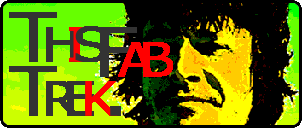



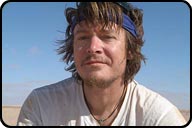
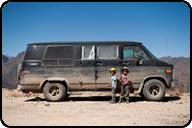
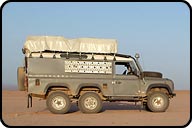

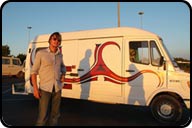
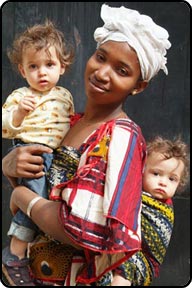
 contains Festival/Fiesta/Art photography.
contains Festival/Fiesta/Art photography.
